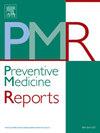在加州旧金山,自我报告残疾的跨性别女性更容易受到心理困扰和产生自杀念头
IF 2.4
3区 医学
Q2 PUBLIC, ENVIRONMENTAL & OCCUPATIONAL HEALTH
引用次数: 0
摘要
对跨性别女性的研究发现,健康,尤其是心理健康,受到社会不平等和多重、交叉的结构性脆弱性的影响。虽然一些研究表明,变性成年人也比顺性成年人更有可能患有残疾,但很少有研究探讨这一交叉点。我们评估残疾状况与跨性别女性心理压力和自杀意念之间的可能联系。方法分析2019-2020年全国跨性别HIV行为监测(NHBS-Trans)研究旧金山站点的数据,探讨跨性别女性残疾状况对心理健康的影响。卡方检验和Fisher精确检验来评估残疾状况和心理困扰之间的关系。多变量logistic回归模型评估了这些关联的程度,调整了潜在混杂因素。结果71.14%的样本(N = 201)报告患有一种或多种残疾。与无残疾的参与者相比,1+残疾的参与者报告高水平心理困扰的几率超过10倍(aOR 10.46, 95% CI 3.06-35.74),报告自杀意念的几率超过5倍(aOR 5.83, 95% CI 1.69-20.15)。2+残障者报告自杀意念的几率是无残障者的10+倍(aOR 10.77, 95% CI 2.94-39.51)。结论残疾跨性别女性面临着多重交叉的不平等,这可能是由于生活在一个不是基于性别认同和残疾状况为她们建立的世界。由此产生的心理困扰,加上变性恐惧症和残疾歧视,会加剧心理健康问题。本文章由计算机程序翻译,如有差异,请以英文原文为准。
Increased vulnerability to psychological distress and suicidal ideation among transgender women with self-reported disabilities in San Francisco, California
OBJECTIVE
Research among transgender women has found health, but especially mental health, to be shaped by social inequities and multiple, intersectional, structural vulnerabilities. While some studies have shown that transgender adults are also more likely to have a disability than cisgender adults, few studies have explored this intersection. We assess possible associations between disability status and psychological stress and suicidal ideation among transgender women.
METHODS
We analyzed data from the San Francisco site of the National HIV Behavioral Surveillance Transgender (NHBS-Trans) Study (2019–2020) to explore how disability status among transgender women influences mental health. Chi-squared and Fisher's exact tests to assess associations between disability status and psychological distress. Multivariable logistic regression models assessed the magnitude of these associations adjusted for potential confounders.
RESULTS
71.14 % of the sample (N = 201) reported living with one or more disabilities. Participants with 1+ disabilities had more than 10 times the odds of reporting high levels of psychological distress (aOR 10.46, 95 % CI 3.06–35.74) and more than five times the odds of reporting suicidal ideation (aOR 5.83, 95 % CI 1.69–20.15) compared to those with no disabilities. Participants with 2+ disabilities had 10+ times the odds of reporting suicidal ideation compared to participants with no disabilities (aOR 10.77, 95 % CI 2.94–39.51).
CONCLUSIONS
Transgender women living with disabilities face multiple intersecting inequities likely attributable to living in a world that is not built for them on the basis of gender identity and disability status. The resulting psychological distress, alongside transphobia and ableism, can exacerbate mental health issues.
求助全文
通过发布文献求助,成功后即可免费获取论文全文。
去求助
来源期刊

Preventive Medicine Reports
Medicine-Public Health, Environmental and Occupational Health
CiteScore
3.90
自引率
0.00%
发文量
353
 求助内容:
求助内容: 应助结果提醒方式:
应助结果提醒方式:


